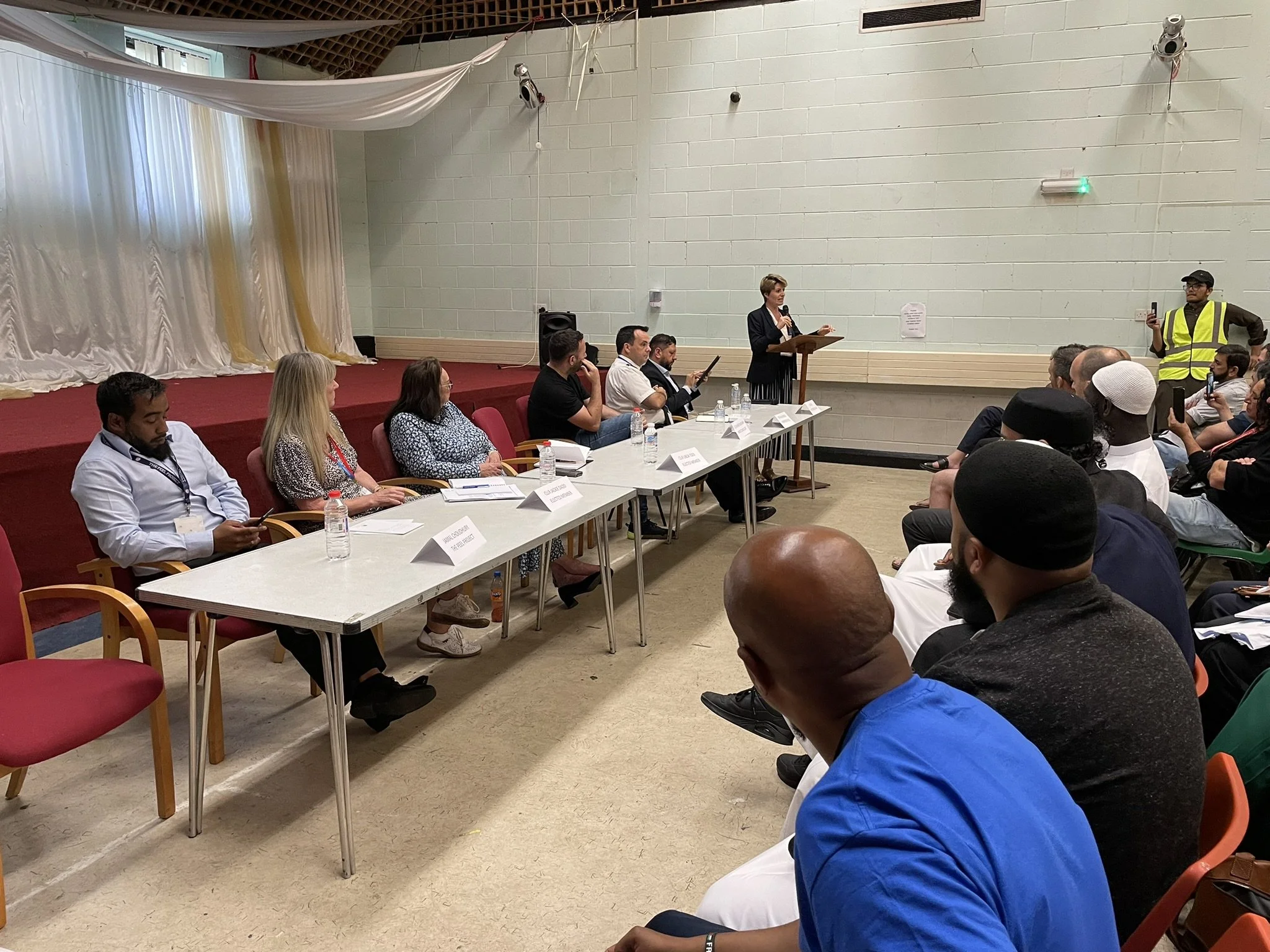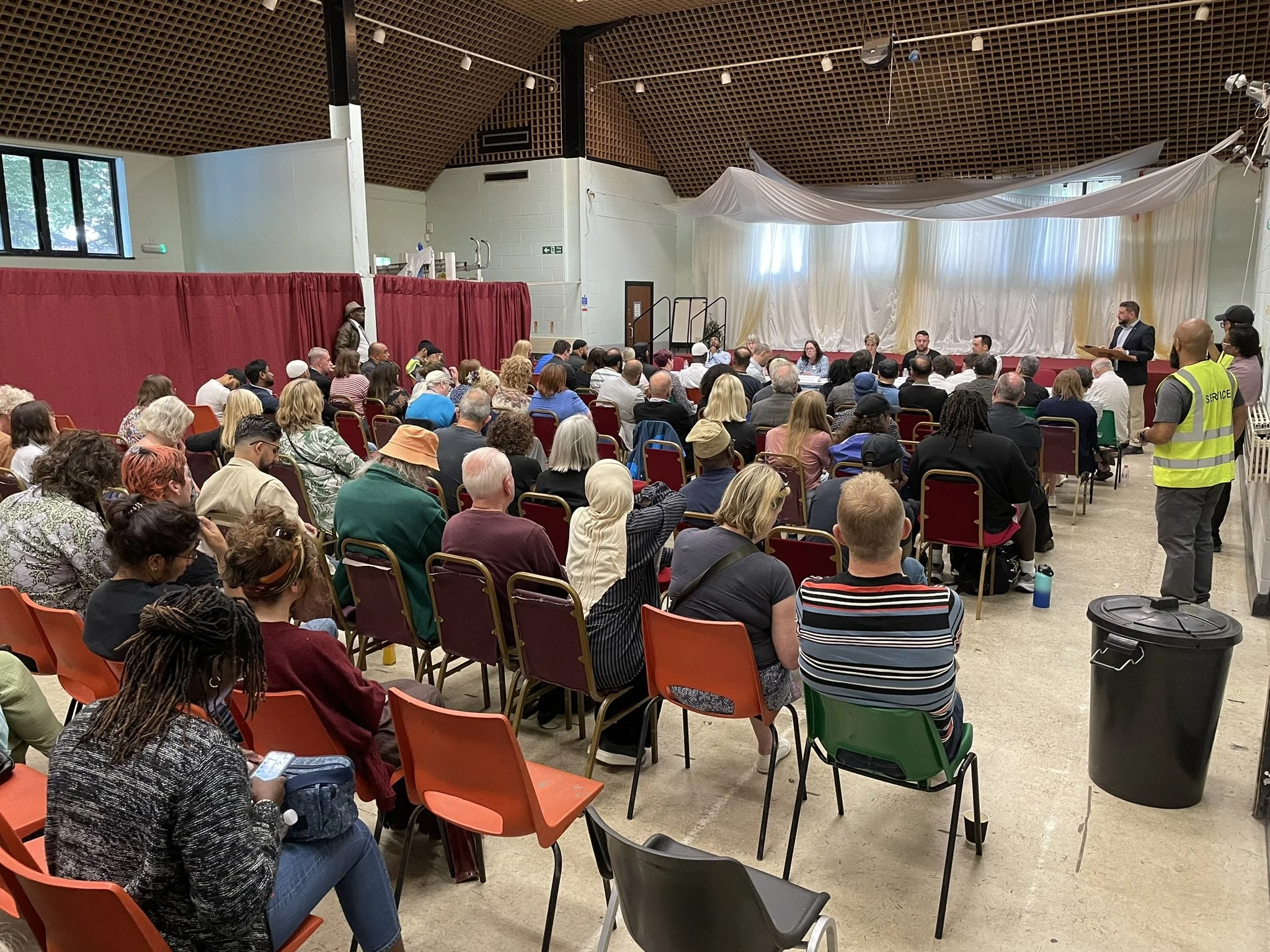‘Families are scared to go out, but solidarity will get us through this’
‘PEOPLE CALLED ME IN TEARS’: Zia Salik
By Phil Ascough
A crackdown on incitement and hatred coupled with better communication between police, local authorities and community groups is seen as the key to rebuilding confidence shattered by the riots of August 3.
Zia Salik, chair of Hull Mosque, told The Hull Story people across the city welcomed the tough sentences being handed down by the courts to criminals convicted of the most serious offences of violence, making families too terrified to leave their homes.
He said community groups of all faiths had indicated that looters also should not escape the consequences of their actions, but the police and the courts need to set clear priorities.
“People who were targeted specifically because of their religion and their race should be prioritised over sausage rolls and shoes”, he said.
Zia was speaking a week after chairing a packed meeting of community leaders at Spring Bank Community Centre. The panel featured Jamal Choudhury of The Peel Project, a senior officer from Humberside Police, three members of Hull City Council, and Emma Hardy, the MP for the Hull West and Haltemprice constituency which covers the city centre.
Among the audience was a multicultural mix of people from various organisations representing communities, health, education, arts and culture, regeneration and more.
Zia said the meeting was called in partnership with The Peel Project and the Crisis Response Team – a group of local volunteers who mobilise to support people in need either overseas or at home – because of the need to keep the impact of the riots at the forefront of public awareness.
He said: “We knew the council and the police were taking it seriously and they were putting plans in place but because the message was not getting back to the community, people thought nothing was happening.
“We tried to get together as many different groups as possible. From our perspective one of the biggest targets for the attack was the Muslim community – number one – plus migrants, refugees and asylum seekers.
“Some of the speeches in the city centre were specifically talking about migrants, asylum seekers and inciting violence and that turned into physical violence, throwing bricks at the [Royal] hotel and going to the mosque.
‘HER PRESENCE MATTERED’: Constituency MP Emma Hardy speaks at the meeting
“People were calling it thuggery, not something driven by hatred and racism. But hate crime is not based on what the perpetrator does, it’s how the victim feels, and the victims on August 3 felt this was an Islamophobic attack.
“Because of the location of the meeting we couldn’t accommodate more than 100 people. Initially we thought we would have a public forum but we didn’t know how many would turn up. Also there was a lot of anger and we didn’t want it to turn into a screaming match, we wanted something to come out of it.”
Zia was born in Pakistan and came to Hull with his family when he was five. His brother Abid Salik accepted the post of Imam at Hull Mosque in 2021 following the death in 2020 of the previous Imam, their father Hafiz Salik.
In 2013 Hafiz lost the sight of on eye after he was attacked in Spring Bank West by a stranger who stopped his car and punched him in the face. After the incident, communities across the city rallied round and the call is to promote the same solidarity now against the wider threat demonstrated by the riots.
The initial protest was billed in literature circulated by the organisers as “Enough is enough” and presented as a tribute after the killing of three little girls in Southport, which was followed by false claims on social media about the background and religion of the 17-year-old suspect.
The leaflet added that people were welcome to take “flowers or teddy bears etc”, but there were also tell-tale signs pointing to another agenda.
The organisers pleaded: “Try to be as sober as you can. There will be time for drinking afterwards if that’s what you want to do.”
The political message was clear: “We are fed up of seeing people entering this country illegally and being given a free ride. Hearing illegal immigrants demand, demand, demand in the name of Human Rights.”
As numbers of protestors swelled their anger and hostility became more visible. Members of the public were being assaulted even before the mob moved on from Queen Victoria Square to mount an attack on the Royal Hotel and against police with riot shields who were trying to defend it.
A car and its occupants were attacked at the corner of Milky Way and Hall Street, where businesses were also targeted. In the city centre many employers had to send staff home and close for the day after criminals went on the rampage, smashing doors, windows and internal fittings, looting property and setting fires. Well into the evening, and hours after the start time of the initial “protest”, the transport interchange was closed because of the violence.
Zia was on Spring Bank when the mosque there came under attack. He said: “We had to try and defend it. There was a lot of fear because people weren’t sure the police would be able to hold everybody off.”
Introducing the meeting at Spring Bank Community Centre the following week, Zia said: “The objective is to bring together the community and the people and organisations that lead it and for that community to say we need to do something.
“We have to acknowledge the fear and anxiety that these events have instilled in our community. Families are scared to go out, scared to go to the city centre, scared to go to the park. It’s a self-imposed lockdown and it’s not specific to our own community but we are really feeling it.
“We must take the historical context into account and the lessons learned. There are things that need to change on a scale that’s way above our heads. The rules that we live by today were drafted long before the circumstances in which we find ourselves.”
Zia became a volunteer at the mosque in his mid-teens. He went to school, college and university in Hull and has pursued a career around bringing communities together. He has worked with Hull City Council, Humberside Police and the NHS and his day job is deputy director at Islamic Relief UK, which works to promote sustainable economic and social development by working with local communities.
Zia told the meeting about some of the calls he received in the days after the riots. He said: “People on the phone to me broke down crying. They said they were so scared and had never been this scared in their lives. People have not been into the city centre since August 3rd. The fear present on that day is something most Muslims are feeling – you can see it in their face and you can hear it in their voice.”
He introduced one local resident who at first said she was too scared to know what to say: “She said she would try. I asked her to speak from the heart and share her feelings. It was very raw and very real and an echo of what we have been hearing in the community.”
The woman said: “I just feel really upset and scared and emotional. I can’t actually put into words how I am feeling. My family has been here since the 1980s and this is my home.
“For something like that to happen in my home is just terrifying. I am stopping my boys going to the mosque. This is the first time in my life I have felt I don’t belong where I thought was my home but I don’t have anywhere else to call my home. This is my home. The postman came knocking on my door and I was scared to open it. It should be a safe place for me. I don’t know how to express how I feel at the moment.”
Zia said warnings of violence to come were not taken seriously enough, but he praised police and the local authority for their response after the riots.
PACKED: A community meeting was held in response to the violence
He said: “We definitely knew there was something on the horizon because of messages online and on social media. We also received emails from people within the community, non-Muslims, who had seen things on Facebook calling for violence. There were warning signs but it was being taken for granted that things were OK, so this was a wake-up call.
“I appreciated the contribution from the police. They were quite open in terms of what steps have been taken and are being taken. The elected officials said what you would expect them to say and it was important that they were willing to come and step up. They could have hidden behind the investigation but you got the impression that they care and value the community, coming along to speak and to listen. More than what they said their presence spoke volumes, and it was the same with Emma Hardy.”
Zia echoed the message from the police that the riots nationwide were fuelled by the malicious distribution of misinformation on social media, and the way forward is for people to look for information from trusted sources.
He said: “People needed a response from the authorities because the first step in getting trust is for them to feel that the authorities are taking them seriously.
“Swift justice is important and what we have seen is part of that but the focus on swift justice was not being prioritised in the way we felt it should. What was being prioritised was the looters and the kids who maybe were in the city centre getting carried away and acting on impulse.
“What we want to be prioritised is those who incited hatred in speech and online that led to the physical violence at the hotel and the mosque and those who carried out those acts of violence.
“What the kids did was unacceptable and they need to be held to account for that but nobody wants a moment of stupidity to ruin their futures. The people who incited the violence and threw bricks at the hotel and the mosque were grown men.
“People who stoke hatred and incite violence need to be held to account because they are the ones who used the incident in Southport, made up their own story and peddled that misinformation online. That became the match that lit the fire.”
He also underlined the part played by the community at the meeting and in the days that followed.
He said: “The solidarity and unity within the community and the counter protest numbers that turned up were very impressive. If hate groups become unopposed they feel there’s nobody to hold them to account so public solidarity is important.”
Become a Patron of The Hull Story. For just £2.50 a month you can help support this independent journalism project dedicated to Hull. Find out more here




